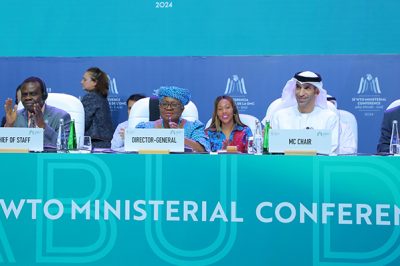Abu Dhabi, 2 March 2024 (WAI): The conclusion of the 13th ministerial summit of the World Trade Organization (WTO), held in Abu Dhabi on Saturday, marked by the temporary extension of an e-commerce moratorium and the absence of agreements on agriculture and fisheries, casts doubt on the future of global trade cooperation.
The WTO, the sole international body handling trade rules between nations, needs complete consensus from all members to finalize deals. It anticipated that the MC13 would mirror the significant achievement of its 2022 ministerial in Geneva, which produced an agreement on fisheries and witnessed members agreeing to reinstate a defunct dispute settlement system by year-end. However, the latest ministerial did not achieve that goal. At MC13, India strongly objected to a revised draft fisheries agreement.
As farmer protests spread throughout Europe and India, discussions about agriculture accords became particularly sensitive. India’s strong preference for permanent regulations governing the public stockpiling of food reserves, instead of the WTO’s temporary provisions, impeded progress on the agriculture package.
Although unsuccessful in achieving agreements on agriculture and fisheries, the WTO succeeded in temporarily extending a moratorium on customs duties for digital transmissions for another two years. It encountered significant opposition at MC13, with countries led by India and South Africa arguing that it undermines customs revenues.
Also Read: Replace Poor Governance with Good Governance
Regarding dispute settlement reform, the outcome primarily reaffirmed the commitment made at MC12 to establish a fully operational dispute settlement system by 2024.
During the closing press conference, Thani Al Zeyoudi, the Emirati chair of the so-called MC13 gathering, acknowledged the shortcomings. “Despite our best efforts, we failed to agree on some texts which are of great importance to many of our members,” said Al Zeyoudi, who also serves as the UAE’s foreign trade minister.
I am currently pursuing a Bachelor’s degree in International Relations. My areas of interest include Current Affairs, Diplomacy and International Political Economy.








